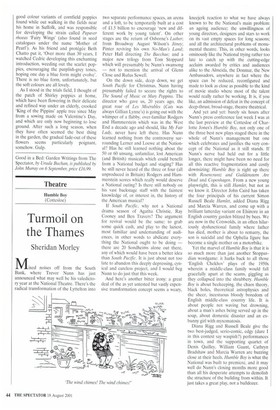Turmoil on the Thames
Sheridan Morley
Mixed noises off from the South Bank, where Trevor Nunn has just announced what may well be his valedictory year at the National Theatre. There's the radical transformation of the Lyttelton into
two separate performance spaces, an arena and a loft, to be temporarily built at a cost of £1.5 billion to encourage 'new and different work by young talent'. On other stages are the return of Osborne's Luther; from Broadway August Wilson's Jitney; Pinter reviving his own No-Man's Land; Peter Hall directing The Bacchae; and a major new trilogy from Tom Stoppard which will presumably be Nunn's swansong — not to mention the arrival of Glenn Close and Rufus Sewell.
On the down side, deep down, we get South Pacific for Christmas, Nunn having presumably failed to secure the rights to The Sound of Music or Mary Poppins. The director who gave us, 20 years ago, the great roar of Les Miserables (Cats was always Gillian Lynne's) is going out with the whimper of a flabby, over-familiar Rodgers and Hammerstein which was in the West End a decade ago and should, like My Fair Lady, never have left there. Has Nunn learned nothing from the controversy surrounding Lerner and Loewe at the National? Has he still learned nothing about the 50 or 60 unsung, unfamiliar, lost American (and British) musicals which could benefit from a National budget and staging? Has he still never heard of the three or four (all unproduced in Britain) Rodgers and Hammerstein scores which really would deserve a National outing? Is there still nobody on his vast backstage staff with the faintest knowledge of, or interest in, the history of the American musical?
If South Pacific, why not a National drama season of Agatha Christie, Ray Cooney and Ben Travers? The argument for revival would be the same: to grab some quick cash, and play to the laziest, most familiar and undemanding of audiences, in other words to abdicate everything the National ought to be doing — there are 20 Sondheims alone out there, any of which would have been a better idea than South Pacific. It is just about not too late to abandon this deeply depressing, cynical and careless project, and I would beg Nunn to do just that this week.
And here's another bitter irony: a great deal of the as yet untested but vastly expensive transformation concept seems a weary, kneejerk reaction to what we have always known to be the National's main problem: an ageing audience; the unwillingness of young directors, designers and stars to work on its vast empty spaces for long seasons; and all the architectural problems of monumental theatre. This, in other words, looks ominously like the National trying rather too late to catch up with the cutting-edge acclaim awarded by critics and audiences alike to the Almeida, the Donmar, the New Ambassadors, anywhere in fact where the space can be reduced, reconfigured and made to look as close as possible to the kind of movie studio where most of the talent would really rather be working. It is, if you like, an admission of defeat in the concept of deep-thrust, broad-stage, theatre theatrical.
And yet and yet: barely six hours after Nunn's press conference last week I was at the last preview at the Cottesloe of Charlotte Jones's Humble Boy, not only one of the three best new plays staged there in the whole of Nunn's management but one which celebrates and justifies the very concept of the National as it still stands. If Nunn's nerve had held out for a little longer, there might have been no need for all this reactive fragmentation and costly downsizing: Humble Boy is right up there with Rosencrantz and Guildenstem Are Dead and Copenhagen. From a new young playwright, this is still Hamlet, but not as we know it. Director John Caird has taken the four principals of his current Simon Russell Beale Hamlet, added Diana Rigg and Marcia Warren, and come up with a brilliant latterday variant on Elsinore in an English country garden blitzed by bees. We are now in the Cotswolds, in an often hilariously dysfunctional family where father has died, mother is about to remarry, the son is suicidal and the Ophelia figure has become a single mother on a motorbike.
Yet the marvel of Humble Boy is that it is so much more than just another Stoppardian wordgame: it harks back to all those 'English Chekhov' plays of the 1950s wherein a middle-class family would fall gracefully apart at the seams, giggling as they collapsed into the shrubbery. Humble Boy is about beekeeping, the chaos theory, black holes, theoretical astrophysics and the sheer, incestuous bloody boredom of English middle-class country life. It is about people not waving but drowning, about a man's ashes being served up in the soup, about domestic disaster and an exbunny girl with myxomatosis.
Diana Rigg and Russell Beale give the two best-judged, serio-comic, edgy (dare I in this context say waspish?) performances in town, and the supporting quartet of Denis Quilley, William Gaunt, Cathryn Bradshaw and Marcia Warren are buzzing close at their heels. Humble Boy is what the National was built to premiere, and it may well do Nunn's closing months more good than all his desperate attempts to demolish the structure of the building from within. It just takes a great play, not a bulldozer.


























































 Previous page
Previous page